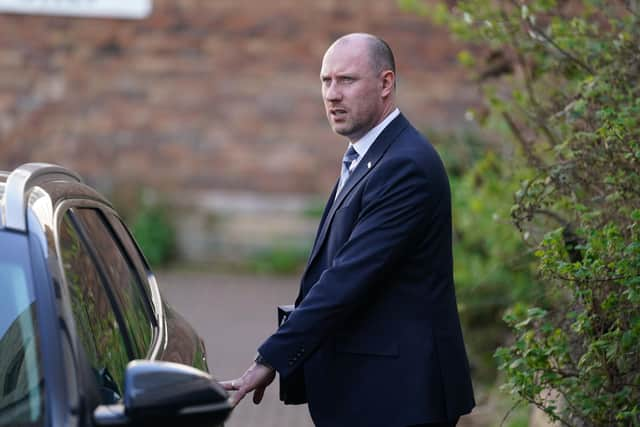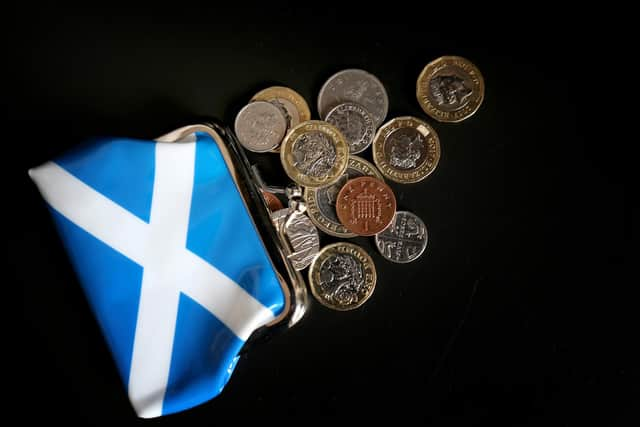Exclusive:Economy secretary hints council tax rises may not go ahead despite proposals
Plans to increase council tax among those in higher bands could be ditched or rolled back, the economy secretary has suggested.
The Scotsman also understands the process that has led to the recent consultation dates back to the previous leadership, with the new cabinet not wedded to the proposals in the consultation.
Advertisement
Hide AdAdvertisement
Hide AdNews of the plans leaked earlier this month, with the Daily Record newspaper obtaining a Cosla report, leading to Dave Moxham of the STUC claiming the proposal is “tinkering around the edges” when the whole system should instead be scrapped.


If implemented, the plans would see council tax for homes in bands E, F, G and H increased on a sliding scale of 7.5 per cent, 12.5 per cent, 17.5 per cent and 22.5 per cent, to address concerns about the fairness of the charge.
Some 28 per cent of properties in Scotland are believed to be in the bands that would be impacted, but only 0.5 per cent of them are in the highest council tax band.
Speaking to The Scotsman last week, Neil Gray said that any changes to council tax “have to be proportionate” and said discussions were ongoing about their final shape.
He said: “Council tax decisions are obviously for local government to make.


"We’ve obviously gone through a really important discussion with local government that has led to the Verity House agreement which is about having a new deal with local government, ensuring that they have as much of the decision making power and the resources as possible to be able to deliver their services locally and to be accountability locally to do that.
"The consultation that we’re running is about how we can ensure how local government continues to be effectively resourced to do so.
"But, in all these things we have to be proportionate and ensure that the asks that we make of our citizens to pay in tax can be evidenced as being delivering in terms of good public services. That’s why we’ve got a progressive income tax system here in Scotland."
Advertisement
Hide AdAdvertisement
Hide AdMr Gray, who was appointed economy secretary by Humza Yousaf, said the proposals for increased taxation was required due to a decade of austerity and increased inflation.
He said: “If we really wanted to get to the heart of why we are having to make these decisions or consultations around revenue raising opportunities, it’s because of the situation we are finding ourselves in and the public finance landscape which is a direct result of a decade long and more austerity agenda from Westminster, and a Tory government that crashed the economy and has delivered spiralling levels of inflation that are being felt across our communities, businesses, and by government and local government.
"We have to respond to the situation we find ourselves in, but doing so without the full powers of independence makes that all the more challenging.”
Asked whether councils or central government had pushed for the multiples to be increased for higher bands, Mr Gray refused to comment.
He said: “Those are discussions that are ongoing and obviously there’s a consultation open to decide upon what will finally be agreed as being the parameters within which local government can operate.”
Cosla said the proposed changes followed work by the Joint Working Group on council tax, established as part of the Bute House Agreement with the Scottish Greens.
The local government representative body also highlighted that the proposed increases would still see the average council tax bill be lower than an equivalent in England for all but Band H properties, those valued the highest.
Casey Smith, a researcher at the IPPR Scotland think tank, said council tax should be “replaced altogether” by the Scottish Government due to being an “outdated, regressive tax”, but said increasing the amount paid by higher bands would “improve the system progressively”.
Advertisement
Hide AdAdvertisement
Hide AdThey added: “It also doesn’t raise enough money for councils who are struggling to adequately fund vital public services.
“Ultimately the Scottish government should be looking to reform or replace council tax altogether, but this would take time to implement so short-term reforms to improve the system now would be sensible. The Scottish government could improve the system progressively by implementing higher increases on bills for properties in higher bands, while at the same time extending eligibility for the Council Tax Reduction scheme to more low income households. This could achieved by automatically passporting Universal Credit recipients to Council Tax Reduction to boost household finances and would go a long way in helping to ensure no one in poverty is asked to pay council tax”.
When the consultation over council tax was announced, Scottish Tory local government spokeswoman Liz Smith said the “bombshell proposals” would “terrify people struggling to cope with the global cost-of-living crisis”.
Her counterpart at Scottish Labour, Mark Griffin, accused the Scottish Government of “asking ordinary Scots to foot the bill for its own economic failure”.
Launching the Consultation earlier this month, Cllr Katie Hagmann, COSLA’s Resources Spokesperson, said:
“For many years there have been calls to make the council tax system fairer. We are pleased to be working jointly with the Scottish Government to explore ways that we can achieve this. A fairer and more progressive Council Tax is what the proposals in this Consultation aim to do."
Comments
Want to join the conversation? Please or to comment on this article.
